Border Security Force
| Border Security Force | |
|---|---|
140px Emblem of the Border Security Force | |
| Abbreviation | BSF |
| Motto | जीवन पर्यन्त कर्तव्य (Duty Unto Death)[1] |
| Agency overview | |
| Formed | 1 December, 1965 |
| Employees | 257,363 Active Personnel[2] |
| Annual budget | ₹17,118.64 crore (US$2.4 billion) (2016-17 est.)[3] |
| Jurisdictional structure | |
| Federal agency | IN |
| Operations jurisdiction | IN |
| Governing body | Ministry of Home Affairs (India) |
| Constituting instrument |
|
| General nature |
|
| Headquarters | New Delhi, India |
| Minister responsible |
|
| Agency executive |
|
| Parent agency | Ministry of Home Affairs |
| Facilities | |
| Boats | 100+ |
| Planes | 22 Aircraft (as of 2009) |
| Website | |
| bsf.nic.in | |
The Border Security Force (BSF) is the primary border defence organisation of India. It is one of the five Central Armed Police Forces of the Union of India, it was raised in the wake of the 1965 War on 1 December 1965, "for ensuring the security of the borders of India and for matters connected there with".[5][6] It is a Central Armed Police Force charged with guarding India's land border during peacetime and preventing transnational crime. It is a Union Government Agency under the administrative control of Ministry of Home Affairs. The BSF has its own cadre of officers but its head, designated as a Director-General (DG), since its raising has been an officer from the Indian Police Service. It is an Armed Force of the Union of India tasked with various assignments from time to time.[6] The BSF has grown exponentially from a few battalions in 1965, to 186 battalions with a sanctioned strength of 257,363 personnel including an expanding air wing, marine wing, artillery regiments, and commando units.[7][8] It currently stands as the world's largest border guarding force. BSF has been termed as the First Line of Defence of Indian Territories.[9]

The unique BSF Camel Contingent during the annual Republic Day Parade.
Contents
1 History
2 Engagements
3 Formation
4 List of Chiefs of BSF
5 Wagah Border Flag Lowering Ceremony
6 Counter-Insurgency Operations
7 Organisation
8 BSF's role during peacetime
9 BSF's role during war time
10 Guarding Myanmar (Burma) Border
11 ORBAT
12 Proposed ORBAT for Myanmar Border
13 Rank structure (gazetted officers)
14 Roll of honour
14.1 Military awards
14.2 Civil awards
14.3 Police medals
14.4 Arjuna awardees
15 Equipment
15.1 Pistols and handguns
15.2 Sub-machine guns and carbines
15.3 Assault rifles
15.4 Machine guns
15.5 Sniper rifles
15.6 Multi-role recoilless rifle
15.7 Artillery
16 Gallery
16.1 Air defence
16.2 Aircraft
16.3 Elite Commando Force of Border Security Force
16.4 Mine Protected Vehicles
17 Planning and development
18 Criticism and controversy
18.1 Condemnation by Canada
18.2 Bangladesh border killings
19 See also
20 References
21 External links
History
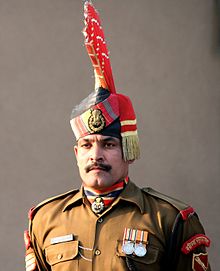
A soldier of India's Border Security Force in one of the ceremonial uniforms.
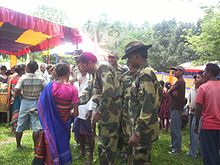
BSF soldiers contributing and supporting at a Medical Camp, India.
From independence in 1947 to 1965, the protection of India's international boundaries was the responsibility of local police belonging to each border state, with little inter-state coordination. BSF was created as a Central government-controlled security force to guard all of India's borders, thus bringing greater cohesion in border security. BSF is charged with guarding India's land border during peacetime and preventing transnational crime. It is a Union Government Agency under the administrative control of the Ministry of Home Affairs. It is one of many law enforcement agencies of India.[10] It currently stands as the world's largest border guarding force.[11]
Engagements
- Indo-Pakistani War of 1971
- Operation Blue Star
- Operation Black Thunder
- Counter-Insurgency in Jammu and Kashmir
- Operation Vijay - Kargil War
- 2001 Bangladeshi-Indian Border skirmishes
- 2001-2002 Operation Prakarm - India-Pakistan Standoff
- 2013 India-Pakistan Border skirmishes
- 2014–15 India–Pakistan border skirmishes
Formation
During the Indo-Pakistani War of 1965, the border management system was in the hands of the individual state police forces, and these proved incapable of properly dealing with border threats. Following these episodes, the government created the Border Security Force as a unified central agency with the specific mandate of guarding India's international boundaries. K F Rustamji, from the Indian Police Service, was the first Director General of BSF. Till 1965 India’s borders with Pakistan were manned by the State Armed Police Battalion. Pakistan attacked Sardar Post, Chhar Bet, and Beria Bet on 9 April 1965 in Kutch. This exposed the inadequacy of the State Armed Police to cope with armed aggression due to which the Government of India felt the need for a specialized centrally controlled Border Security Force, which would be armed and trained to man the International Border with Pakistan. As a result of the recommendations of the Committee of Secretaries, the Border Security Force came into existence on 1 Dec 1965 with K F Rustamji as its first Director General.[10]
The BSF's capabilities were used in the Indo-Pakistani War of 1971 against Pakistani forces in areas where the Regular Forces were thinly spread; BSF troops took part in several operations including the famous Battle of Longewala. In fact, for BSF the war on eastern front had started well before the war actually broke out in Dec '71. BSF had trained, supported and formed part of "Mukti Bahini" and had entered erstwhile East Pakistan before the actual hostilities broke out. BSF had played a very important role in Liberation of Bangladesh which Indira Gandhi and Sheikh Mujibur Rehman had also acknowledged.
The BSF, long considered a male bastion, has now deployed its first batch of women personnel at the border to carry out regular frisking of women as well as other duties performed by their male counterparts, including guarding the border. Over 100 women have been deployed on the highly volatile Indo-Pak border, while around 60 will be deployed on the Indo-Bangla border. In total, 595 women constables will be deployed on the border in different phases.
List of Chiefs of BSF
Mr K F Rustamji IPS[12] was the first Director General of Border Security Force from 21 July 1965 to 30 September 1974 & current Director General is Mr Rajni Kant Mishra IPS, since 1st October 2018.[13]
| Sr No. | Name | Period (From) | Period (To) |
|---|---|---|---|
| 24 | Rajni Kant Mishra | 1 October 2018 | present |
| 23 | K K Sharma | 29 Feb 2016 | 30 September 2018 |
| 22 | D K Pathak | 28 Feb 2014 | 28 Feb 2016 |
| 21 | Subhash Joshi | 01 Dec 2012 | 28 Feb 2014 |
| 20 | U K Bansal | 01 Nov 2011 | 30 Nov 2012 |
| 19 | Raman Srivastava | 01 Aug 2009 | 31 Oct 2011 |
| 18 | M L Kumawat | 01 Oct 2008 | 31 Jul 2009 |
| 17 | A K Mitra | 27 Feb 2006 | 30 Sep 2008 |
| 16 | R S Mooshahary | 10 Jan 2005 | 27 Feb 2006 |
| 15 | Ajay Raj Sharma | 01 Jul 2002 | 31 Dec 2004 |
| 14 | Gurbachan Jagat | 30 Nov 2000 | 30 Jun 2002 |
| 13 | E N Rammohan | 04 Dec 1997 | 30 Nov 2000 |
| 12 | A K Tondon | 01 Oct 1996 | 04 Dec 1997 |
| 11 | Arun Bhagat | 04 Dec 1995 | 01 Oct 1996 |
| 10 | D K Arya | 01 Feb 1994 | 04 Dec 1995 |
| 09 | Prakash Singh | 09 Jun 1993 | 31 Jan 1994 |
| 08 | T Ananthachary | 01 Aug 1991 | 31 May 1993 |
| 07 | H P Bhatnagar | 01 Aug 1987 | 31 Jul 1991 |
| 06 | M C Mishra | 01 Oct 1984 | 31 Jul 1987 |
| 05 | Birbal Nath | 02 Oct 1982 | 30 Sep 1984 |
| 04 | K Rama Murti | 01 Dec 1980 | 31 Aug 1982 |
| 03 | Sharawan Tondon | 01 Jan 1979 | 30 Nov 1980 |
| 02 | Aswini Kumar | 01 Oct 1974 | 31 Dec 1978 |
| 01 | K F Rustamji | 21 Jul 1965 | 30 Sep 1974 |
Wagah Border Flag Lowering Ceremony

BSF at Wagah
Every evening, at the Wagah border, which is the international border of India and Pakistan, the BSF together with the neighbouring country's border guarding, the Pakistan Rangers conduct a military drill while lowering the respective national flags. This attracts a good number of spectators from both countries, as well as international tourists. Similar parades are being organised at Mahavir/Sadqi border near Fazilka and Hussainiwala/Gandasinghwala border near Firozpur.
Counter-Insurgency Operations
Although originally charged with guarding India's external boundaries, the BSF has more recently been given the task in counter-insurgency and counter-terrorism operations in Jammu And Kashmir, Punjab, North East. While in Punjab BSF took Part in operations like Blue Star, Black Thunder 1 & 2 till 1989 and when the insurgency in Jammu and Kashmir broke out in 1989, the BSF handover the Counter Insurgency Operations to CRPF and Punjab Police and moved towards state of Jammu & Kashmir. In Jammu and Kashmir state police and the thinly-deployed Central Reserve Police Force (CRPF) struggled to cope up with the spiraling violence, and the Indian government deployed the BSF to Jammu and Kashmir to combat separatist militants.
The BSF initially suffered casualties from insurgent attacks but later saw successes, including the arrest of militant leaders, after setting up an intelligence network and working with local civilians. BSF contribution in reducing militancy in J&K is widely acknowledged. The BSF killed Ghazi Baba—chief of Jaish-e-Mohammed and the mastermind of the 2001 Indian Parliament attack—in August 2003 along with his deputy commander. The BSF raided Baba's hideout in Srinagar and he was killed in the ensuing gun battle along with his deputy chief.
Despite the BSF's success in a counter-terrorism role, many in the government felt that this additional burden was leading to a dilution of the BSF's mandate and degrading the force's ability to perform its primary role of guarding the country's borders. In 2006 the Indian government has decided to implement recommendations to restrict each security agency to its mandate. Thus the 16 BSF battalions in Jammu and Kashmir are gradually being withdrawn from counter-insurgency duties and diverted back to guard the Indo-Pak border. They are being replaced by fresh units from the CRPF that have undergone specialised training in counter-terrorism. But the CRPF is yet to take over sensitive places like Tral. The 16 battalions being withdrawn from J&K were supposed to provide R&R to the battalions already deployed on the border. But with increasing Naxal violence in Central India, the government decided to diversify the Anti-Naxal operation with the induction of ITBP and BSF. BSF was deployed in Kanker district of Chhattisgarh, where Naxal strength is comparatively thinner than that of other parts of Bastar region. At present total 15 battalions of BSF are stationed in different parts of Kanker district to combat the Naxal menace.
Organisation

Women personnel of BSF taking part in the ceremonial retreat at the India-Pakistan border at Wagah, 2010.

Border personnel from both countries, during the Wagah Border ceremony.
The Border Security Force has its Headquarters at New Delhi and is known as Force Headquarters (FHQ) headed by a Director General. Various Directorates like Operations, Communications & IT, Training, Engineering, General, Law, Provisioning, Administration, Personnel, Armaments, Medical, Finance etc. function under the DG. Each Directorate is headed by an IG. The Eastern Theatre is looked after by Spl DG HQ at Kolkata and the Western Theatre is looked after by Spl DG HQ at Chandigarh. Field Formations in BSF are headed by an IG and are known as Frontiers Headquarters (FtrHQ). There is 10 such Frontier under which Sector Headquarters (SHQ) function headed by a DIG each. There are 31 such Sectors. Each SHQ has under its command 4–5 Duty Battalions. Presently 186 Battalions are sanctioned to BSF. Five major training institutions and 10 Subsidiary Training Centres (STCs) are imparting ab-initio as well as in-service training to its ranks and other CPOs/SPOs including IPS Probationers.
BSF is the only Central Armed Police force to have its own Air Wing, Marine Wing and artillery regiments, which support the General Duty Battalions in their operations. The Financial Adviser of the BSF has been an Indian Revenue Service officer of the rank of Joint Secretary and also has Dy Advisers from the Indian Audit and Accounts Service and Indian Civil Account Service.
The BSF also has a national level school for breeding and training of dogs. Dogs from other CPOs and State Police are sent to National Training Centre for Dogs (NTCD) to be trained in infantry patrol, detection of explosives, tracking and the like.
The BSF maintains a Tear Smoke Unit (TSU), which is unique in India. The TSU is responsible for producing tear gas munitions required for the Anti-Riot Forces. It also exports a substantial quantity to other countries.
Three battalions of the BSF, located at Kolkata, Guwahati, and Patna, are designated as the National Disaster Response Force (NDRF). Each battalion maintains 18 self-contained specialist search and rescue teams of 45 personnel each, including engineers, technicians, electricians, dog squads and medics and paramedics. The establishment of each battalion is 1,158 personnel. The NDRF is a multi-disciplinary, multi-skilled, high-tech force for all types of disasters and can deploy to disasters by air, sea, and land. The battalions are equipped and trained for all natural disasters including combating Nuclear, Biological, and Chemical (NBC) disasters.
BSF's role during peacetime
- To promote a sense of security among the people living in the border areas.
- To prevent trans-border crimes, unauthorized entry into or exit from the territory of India.
- To prevent smuggling and any other illegal activities on the Border.
- Anti-infiltration duties.
- To collect trans-border intelligence.
BSF is largely employed for Internal Security Duties and other law and order duties on the requisition of the State Government. Being a Central Armed Police Force it can be entrusted with policing duties at any place apart from its mandate.
[14]
BSF's role during war time
- Holding ground in assigned sectors.
- Limited aggressive action against irregular forces of the enemy (Though in 1971 war, several instances of battle with regular Army of Pakistan are also there. In Hot War Scenario, one has to fight whoever is pitched against you, regular or irregular.)
- Maintenance of Law and Order in enemy territory administered under the Army's control.
- Guarding of Prisoners of War camps.
- Acting as guides to the Army in border areas.
- Assistance in control of refugees.
- Provision of escorts.
- Performing special tasks connected with intelligence including raids.[14]
Guarding Myanmar (Burma) Border
The Cabinet Committee on Security (CCS) is considering a proposal to entrust the border-guarding duty along the Indo-Myanmar border to the Border Security Force (BSF). Presently, the 1,640 kilometres (1,020 mi) Indo-Myanmar border is being guarded by Assam Rifles.
The proposed move to guard the Indo-Myanmar border follows a proposal from the BSF to take over the role by raising 45 new battalions, one headquarters of additional director general, four frontier headquarters to be headed by an IG rank official and 12 sector headquarters to be headed by DIG level officials.
But the recent rise in Insurgent Activities on Indo-Myanmar Border has forced the Government of India to delay a Border Guarding Force like BSF on Indo-Myanmar Border.
As of 1 March 2015, it was decided by the Ministry of Home Affairs to keep the authority of this border with Assam Rifles only.
ORBAT
- Western Theatre, THQ Chandigarh
- Gujarat Frontier, FHQ Gandhinagar
- Barmer Sector
- Gandhinagar Sector
- Bhuj Sector,
- Rajasthan Frontier, THQ Jodhpur
- Jaisalmer I Sector
- Jaisalmer II Sector
- Bikaner Sector
- Ganganagar Sector
- Punjab Frontier, FHQ Jalandhar
- Ferozepur Sector
- Amritsar Sector
- Gurdaspur Sector
- Jammu Frontier
- Jammu Sector
- Sunderbani Sector
- Rajauri Sector
- Kashmir Frontier, FHQ Humhama, Distt Budgam
- Srinagar Sector
- Baramulla Sector
- Bandipore Sector
- Kupwara Sector
- Gujarat Frontier, FHQ Gandhinagar
- Eastern Theatre HQ, Kolkata
- South Bengal Frontier,[15] Kolkata
- Malda Frontier
- North Bengal Frontier, FHQ Kadamtala, Distt Darjeeling
- Shillong Frontier
- Tripura Frontier, FHQ Agartala
- Mizoram & Cachar Frontier, FHQ Masimpur, Distt Silchar
- Mizoram Frontier
- Cachar Frontier
- CI Ops Manipur
- Guwahati Frontier
Proposed ORBAT for Myanmar Border
- Northeast Theatre HQ, Imphal
- Mizoram Frontier
- Manipur Frontier
- Nagaland Frontier
- Arunachal frontier
Rank structure (gazetted officers)

BSF Embraer

BSF MI17 1V, in TIDANG, UTTARAKHAND
| CAPFs RANKS | POLICE RANKS |
|---|---|
| Director General (Apex Scale of the Indian Police Service) | Director General of a State Police Force |
| Special Director General (HAG+ Scale of the Indian Police Service) | Special Director General of Police |
| Additional Director General (Higher Administrative Grade of the IPS cadre, also available to BSF cadre) | Commissioner of Police or Addl. Director General |
| Inspector General (IG) | I.G or Joint Commissioner |
| Deputy Inspector General (DIG) | Addl. Commissioner or Dy. Inspector General |
| Commandant (Comdt) | Senior Superintendent or Deputy Commissioner |
| Second-In-Command (2 IC) | Superintendent of Police or Dy. Commissioner |
| Deputy Commandant (Dy Comdt) | Addl SP or Addl. DCP |
| Assistant Commandant (Asst Comdt) | Dy SP or Asst. Commissioner |
Being a central Indian police agency and having high presence of Indian Police Service officers, BSF follows ranks and insignia similar to other police organizations in India.
*This rank structure may be equated to corresponding ranks in the defence forces.
Roll of honour
The BSF personnel have been recipients of the following awards:
Military awards
- Mahavir Chakra
- Kirti Chakra
- Vir Chakra
- Ati Vishisht Seva Medal
- Shaurya Chakra
- Sena Medal
- Vishisht Seva Medal
- Mentioned in Despatches
Civil awards
- Padma Bhushan
- Padmashri
- Prime Minister's Medal for life saving
- Arjuna Awards
Police medals
- President's Police Medal for Gallantry
- Police Medal for Gallantry
- President's Police Medal for Distinguished Service
- Police Medal for Meritorious Service
Arjuna awardees
- Comdt (Retd) Nripjit Singh, Volleyball-1962
- Dy Comdt (Retd) Udham Singh, Hockey-1965
- Dy Comdt (Retd) Praveen Kumar, Athletic-1967
- Inspr (Retd) Jagjit Singh, Hockey-1967
- Asst Comdt (Retd) Ajit Pal Singh, Hockey-1970
- Dy Comdt (Retd) Balwant Singh, Volleyball-1972
- Sec-in-Command Anil Kumar, B/Ball-1974
- Dy Inspr Gen (Retd) Mohinder Singh, Shooting-1983
- Asst Comdt Mahabir Singh, Wrestling-1985
- Asst Comdt Subhash Verma, Wrestling-1987
- Inspr Rajesh Kumar, Wrestling-1990
- Inspr Sanjay Kumar, Wrestling-1998
Equipment
All the equipment including the uniforms, weapons, ammunition, vehicles such as the bullet proof vehicles, troop carriers, logistics vehicles, mine protected vehicles are manufactured indigenously at the Indian Ordnance Factories under control of the Ordnance Factories Board.[16]
Pistols and handguns
IOF .32 Revolver – 6 shot handgun
Pistol Auto 9 mm 1A 9 mm × 19 mm
Sub-machine guns and carbines

Heckler & Koch MP5K
Heckler & Koch MP5 A3 9 mm ×19 mm SMG
Heckler & Koch MP5 K 9 mm ×19 mm SMG
Beretta MX4 Storm submachine guns. 68000 SMGs procured and replaced the SAF Carbine 1A.
Assault rifles
AKM: Large calibre assault rifle.
INSAS: 5.56 mm × 45 mm Assault Rifle. Service rifle of the force.
FN FAL Completely phased out as the service rifle by the INSAS rifle but still used as a DMR.
Tavor: X95 or the MTAR-21 version used as the standard issue carbine.
Machine guns
- INSAS LMG
Gun Machine 7.62 mm '1B' OFB Manufactured, modified 7.62 mm NATO Bren.
FN MAG MMG
NSV HMG
@media all and (max-width:720px).mw-parser-output .tmulti>.thumbinnerwidth:100%!important;max-width:none!important.mw-parser-output .tmulti .tsinglefloat:none!important;max-width:none!important;width:100%!important;text-align:center


Sniper rifles
Vidhwansak anti-materiel rifle (AMR) or large-calibre sniper rifle[17]- Steyr SSG 69
Multi-role recoilless rifle

Carl Gustav recoilless rifle
Carl Gustav 84 mm recoilless rifles
AGS-30 Automatic Grenade Launcher
Artillery
- 81 mm Mortar
- 51 mm Mortar
- 120 mm Mortar
- 105 mm Indian Field Gun
Gallery

INSAS Rifle.

Steyr SSG 69 PI.

RPG-7 Rocket Launcher

An Igla-1S missile.
Air defence
MANPADS
SA-16 Gimlet- In Service
SA-7 Grail- In Service, to be phased out
Aircraft
| Aircraft | Photo | Origin | Role | Version | Number | Comment |
|---|---|---|---|---|---|---|
Fixed-wing aircraft (5) | ||||||
| Hawker Siddeley HS 748 | 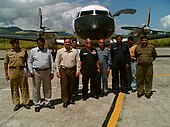 | Tactical transport | HS 748-100 | 2 | As of 2009.[18] | |
| Beechcraft Super King Air | 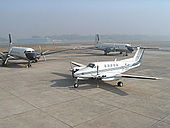 | Utility aircraft | B200 | 1 | Crashed in December 2015[18][19] | |
| Embraer 135 | 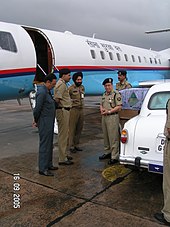 | VIP transport | Embraer-135 J | 2 | As of 2009.[20] | |
Helicopters (16) | ||||||
| HAL Dhruv | 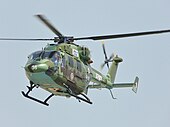 | Utility helicopter | 8 | As of 2009.[18] | ||
| Mi-17 |  | Transport helicopter | Mi-17 Mi-17V5 | 6 2 | As of 2009.[18] As of 2014.[21] | |
Elite Commando Force of Border Security Force
Creek Crocodile Commando are the elite commando force of BSF. It is Rann of Kutch (an extensive salt marsh of western India and southeast Pakistan between the Gulf of Kutch and the Indus River delta. It was the scene of major border disputes in 1965 and 1971).
Creek (Gujarat): In order to thwart landing of terrorists through the sea route, BSF has formed its first commando unit—Creek Crocodiles—to man the hostile creek area where India shares a border with Pakistan.
Creeks are a very hostile terrain, constituting numerous raised grounds having mangroves and a network of water channels which are quite shallow where all movements are tide dependent.
"Creek Crocodiles are trained to thwart any evil designs from across the border", BSF commandant Pushpendra Singh Rathore, who had created and trained the commando unit at Koteshwar outpost of BSF, said.
"We have kept three things in mind while selecting cadets for the commando including swimming and marine diving performance, firing abilities and endurance to work in the rough creek,".[citation needed]
The Crocodile units have 42 commandos at present[when?] and they are undergoing vigorous training, he said.
Mine Protected Vehicles
According to the senior BSF officer, some MPVs have already been introduced in a number of BSF units along the border and more MPVs to be added in the coming years.[22]
Planning and development
Facing difficulty in guarding riverine sections of Indo-Pak border, the BSF has started installing Farheen LASER walls to fill the gaps which saw several breaches by militants from across the border.[23]
Criticism and controversy
Condemnation by Canada
In 2010, some Canadian visa officials rejected the immigration application of a retired BSF soldier Fateh Singh Pandher, terming BSF a "notoriously violent paramilitary unit engaged in systematic attacks on civilians and responsible for torturing suspected criminals". This accusation did not go down well with the Indian government. The Indian External Affairs Ministry was asked by the Home minister to take up the issue with Canada.[24][25] The Home ministry of India, as well as the Indian public in general and several of India's political parties, expressed outrage at this attack and called Canada's actions discriminatory and spurious, and their charges against the BSF as baseless and unproven. The Indian government threatened diplomatic retaliation unless Canada withdrew their allegations. The Canadian government did not respond immediately.[26] It was speculated that diplomatic retaliation from India will consist of banning Canadians going to participate the War in Afghanistan if they are doing so through India. Public outrage in India prompted Canadian authorities to express "great respect for India's armed forces and related institutions".[27] Subsequently, India's Ministry of External Affairs summoned Canadian High Commissioner Joseph Caron and demanded that "the blatant discrimination against Indian security agencies" cease.[28] India's Minister of External Affairs, SM Krishna, condemned Canada's actions and has expressed pride in the accomplishments of the BSF.[29]
Following complaints made by the Indian government and criticism of Canada's actions against India, the Harper government retracted their earlier accusations against BSF security officials. Canada's Minister of Citizenship and Immigration, Jason Kenney, Termed as "unfortunate" the incidents involving use of "foul language by the Canadian High Commission in visa rejection letters to some individuals", Kenney said, "This language, or the inaccurate impression it has created, in no way reflects the policy or position of the Government of Canada."[30]
Bangladesh border killings
According to the Bangladeshi government, 136 civilians were killed and a further 170 others suffered injuries in 2009. The Indian government has said that 67 were killed and 80 injured in 2009.[31] The Bangladesh government and Bangladeshi organizations protested heavily against these alleged killings. Media reports claim that in August 2008, Indian BSF officials admitted that they killed 59 persons (34 Bangladeshis, 21 Indians, rest unidentified) who were trying to cross the border illegally during the prior six months.[32] Indian media claimed that, in 2001, Bangladeshi Border Force kidnapped and murdered 16 BSF personnel because they chased some Bangladeshi goons back to Bangladesh. Since then, the BSF has been compelled to act tough against Bangladeshi illegals[33]
In July 2009 Channel 4 News reported that apparently "hundreds" of Bangladeshis and Indians are indiscriminately killed by the BSF along the Indo-Bangladeshi Barrier. The BSF claims that the barrier's main purpose is to check illegal immigration to India, and prevent cross-border terrorism from Islamists.[34]
Bangladeshi media accused the BSF of abducting 5 Bangladeshi children, aged between 8 and 15, from the Haripur Upazila in Thakurgaon District of Bangladesh, in 2010. The children were setting fishing nets near the border.[35]
In 2010, Human Rights Watch (HRW) issued an 81-page report which alleged "over 900 of abuses by the BSF" in the first decade of the 21st century. The report was compiled from interviews with victims of BSF shootings, witnesses and members of the BSF and its Bangladeshi counterpart. According to HRW, while most of them were killed when they crossed into Indian territory for indulging in cattle raiding or other smuggling activities.[36]
In February 2012, the BSF website was hacked by Bangladeshi hackers in retaliation. The hackers later shared the news in the internet and also in the other social sites where they claimed to have defaced the sites asking the BSF to stop killing Bangladeshis at border. The site became normal sometime on 15 February 2012.[37][38][39][40]
See also
- Assam Rifles
- Border Security Force (Water Wing)
- Central Industrial Security Force
- Central Reserve Police Force
- Indo-Tibetan Border Police
- Sashastra Seema Bal
References
^ "Border Security Force". Archived from the original on 24 December 2014. Retrieved 10 December 2014..mw-parser-output cite.citationfont-style:inherit.mw-parser-output qquotes:"""""""'""'".mw-parser-output code.cs1-codecolor:inherit;background:inherit;border:inherit;padding:inherit.mw-parser-output .cs1-lock-free abackground:url("//upload.wikimedia.org/wikipedia/commons/thumb/6/65/Lock-green.svg/9px-Lock-green.svg.png")no-repeat;background-position:right .1em center.mw-parser-output .cs1-lock-limited a,.mw-parser-output .cs1-lock-registration abackground:url("//upload.wikimedia.org/wikipedia/commons/thumb/d/d6/Lock-gray-alt-2.svg/9px-Lock-gray-alt-2.svg.png")no-repeat;background-position:right .1em center.mw-parser-output .cs1-lock-subscription abackground:url("//upload.wikimedia.org/wikipedia/commons/thumb/a/aa/Lock-red-alt-2.svg/9px-Lock-red-alt-2.svg.png")no-repeat;background-position:right .1em center.mw-parser-output .cs1-subscription,.mw-parser-output .cs1-registrationcolor:#555.mw-parser-output .cs1-subscription span,.mw-parser-output .cs1-registration spanborder-bottom:1px dotted;cursor:help.mw-parser-output .cs1-hidden-errordisplay:none;font-size:100%.mw-parser-output .cs1-visible-errorfont-size:100%.mw-parser-output .cs1-subscription,.mw-parser-output .cs1-registration,.mw-parser-output .cs1-formatfont-size:95%.mw-parser-output .cs1-kern-left,.mw-parser-output .cs1-kern-wl-leftpadding-left:0.2em.mw-parser-output .cs1-kern-right,.mw-parser-output .cs1-kern-wl-rightpadding-right:0.2em
^ "Archived copy" (PDF). Archived from the original (PDF) on 8 August 2017. Retrieved 12 August 2017.CS1 maint: Archived copy as title (link)
^ http://www.indiabudget.gov.in/ub2018-19/eb/sbe48.pdf
^ https://www.thehindu.com/news/national/rajni-kant-mishra-new-chief-of-bsf/article25063023.ece
^ Government Of India (2 September 1968). "THE BORDER SECURITY FORCE ACT, 1968No. 47 of 1968" (PDF) (in English and Hindi). MINISTRY OF LAW (Legislative Department ). pp. 1–2. Archived from the original (PDF) on 17 October 2014. Retrieved 8 September 2014.
^ ab Border Security Force. "ROLE OF THE BSF". Border Security Force, Ministry of Home Affairs. Border Security Force. Archived from the original on 8 September 2014. Retrieved 8 September 2014.
^ "BSF Air Wing". Border Security Force. Border Security Force. Archived from the original on 20 August 2014. Retrieved 8 September 2014.
^ "MHA Report 2016-2017" (PDF). Archived from the original (PDF) on 8 August 2017.
^ "BSF is first Wall of Defence of India, says Home Minister Rajnath Singh at 13th Investiture Ceremony". news.biharprabha.com. ANI. 22 May 2015. Archived from the original on 22 May 2015. Retrieved 22 May 2015.
^ ab "Border Security Force". bsf.nic.in.
^ "Raising Day: Six facts you should know about the exceptional Border Security Force Of India - Guarding India since 1965". The Economic Times.
^ "Border Security Force -Photo Gallary(Civic)". bsf.nic.in. Archived from the original on 26 July 2016.
^ "Border Security Force". bsf.nic.in. Archived from the original on 24 December 2014.
^ ab Page no. 636 & 637 of Chapter 20 India 2013 published by Publications Division of Ministry of Information and Broadcasting, Govt. of India
^ "sb.bsf.gov.in". Archived from the original on 20 November 2014. Retrieved 11 November 2014.
^ "Indian Ordnance Factories: OFB in Brief". Archived from the original on 8 February 2015. Retrieved 11 November 2014.
^ "Anti-material rifle handed over to BSF". The Hindu. Chennai, India. 15 February 2008. Archived from the original on 26 June 2010. Retrieved 13 October 2009.
^ abcd S. Anandan (12 April 2009). "BSF buys 8 Dhruv helicopters". The Hindu. Archived from the original on 19 October 2015. Retrieved 2 December 2014.
^ "10 BSF Personnel Killed As Aircraft Crashes Near Delhi Airport". 22 December 2015.
^ Chethan Kumar (9 January 2015). "IAF gets first overhauled Su-30 MKI". The Times of India. Archived from the original on 10 January 2015. Retrieved 11 January 2015.
^ "Two new Mi-17 helicopters to bolster BSF air wing". Zee News. 29 July 2014. Archived from the original on 11 February 2015. Retrieved 2 December 2014.
^ "Choppers, anti-mine vehicles new teeth for BSF". The Times of India. 18 January 2011.
^ "BSF putting laser wall to fill gaps along Indo-Pak border". indiatimes.com. Retrieved 25 July 2016.
^ "Canada calls BSF a 'violent paramilitary unit'". Hindustan Times. 21 May 2010. Archived from the original on 24 May 2010. Retrieved 21 May 2010.
^ Kumar, Vinay. "Terming BSF". Archived from the original on 8 October 2017.
^ "Canada Visa Application". Times of India. 28 May 2010. Archived from the original on 22 December 2016. Retrieved 29 May 2010.
^ "We have great respect for Indias armed forces -Canada". Times of India. 22 May 2010. Retrieved 29 May 2010.
^ "Visa row, India warns Canada of retaliation". CNN-IBN. Archived from the original on 13 October 2012. Retrieved 29 May 2010.
^ "Visa Row, India warns Canada". Deccanherald.com. Archived from the original on 17 October 2012. Retrieved 21 March 2013.
^
"Canada regrets language used by its officials in visa letters". The Hindu Business Line. Archived from the original on 17 March 2014. Retrieved 29 May 2010.
^ "BSF killed 136 Bangladeshis since 2009". Retrieved 11 November 2014.
^ India says 59 killed over last six months on Bangladesh border Archived 26 October 2008 at the Wayback Machine., Reuters, 24 August 2008.
^ "Fortress India – By Scott Carney, Jason Miklian, and Kristian Hoelscher". Foreign Policy. Archived from the original on 28 March 2013. Retrieved 21 March 2013.
^ "Channel 4 News". 24 July 2009. Archived from the original on 28 December 2009.
^ "BSF abducts 5 children from border". The Daily Star. 24 July 2010. Archived from the original on 26 July 2010. Retrieved 24 July 2010.
^ "India/Bangladesh: Indiscriminate Killings, Abuse by Border Officers". Human Rights Watch. Archived from the original on 23 January 2011. Retrieved 21 January 2011.
^ "Bangladesh group hacks BSF website to 'avenge border killings' - The Times of India". The Times Of India. 15 February 2012.
^ "Archived copy". Archived from the original on 29 February 2012. Retrieved 2012-03-15.CS1 maint: Archived copy as title (link)
^ Template:Cite 2014
^ "বেপরোয়া বিএসএফ : ২৪ ঘণ্টার ব্যবধানে চাঁপাই সীমান্তে আরও দুই বাংলাদেশীকে হত্যা". আমার দেশ. Archived from the original on 11 November 2014. Retrieved 11 November 2014.
External links
| Wikimedia Commons has media related to Border Security Force. |
- Official website
- Border Security Force @ India Defence
- Global Security
- CI Operations in Jammu and Kashmir




